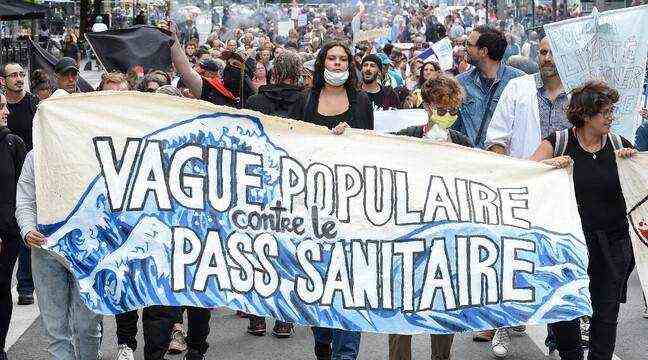The government now assumes. “The vaccine pass is a disguised form of vaccine obligation,” admitted the Minister of Health, Olivier Véran, during an interview with the online media Brut on Saturday. Faced with the arrival of the new Omicron variant in France, the executive intends to increase the pressure on unvaccinated people.
How? ‘Or’ What ? By establishing a “vaccine pass” from January. This new sesame, which should replace the current health pass allowing access to bars, restaurants, cinemas or even long-distance transport, will be detailed in a bill. Submitted to the vote of parliamentarians, this project is already arousing strong criticism within the opposition.
What is the government proposing?
To justify the future project of his government, the Prime Minister considered that it was “not admissible that the refusal of a few million French people to be vaccinated endanger the life of an entire country”. At the end of the health defense council which was held on December 17, Jean Castex announced that the health pass would turn into a “vaccine pass”. “From now on only vaccination will be valid in the past”, he explained. Concretely, only people justifying a complete vaccination schedule will have a valid pass. A negative test will no longer be sufficient.
This vaccination pass will be required in all places where the health pass is required today, namely bars, restaurants, places of leisure and culture, but also long-distance transport (planes, TGV).
“The principle that was mentioned by the Prime Minister is that the trains which are now subject to the health pass will be tomorrow, after the parliamentary debate, subject to the vaccination pass”, confirmed the Minister of Transport on LCI this Sunday evening, recalling that “today, public transport (TER, bus, transiliens or metros) is not subject to a health pass”. Like public transport, shopping centers are not among the places targeted by the government, also said the spokesperson, Gabriel Attal.
At the same time, the government is working on a possible generalization of the health pass in companies. There is no question of requiring a vaccination pass from employees to work (as is the case, for example, for caregivers), but of extending the health pass to other sectors of activity. “Nothing has been acted on at this stage”, however qualified the Minister of Labor, Elisabeth Borne on Monday.
What is the planned timetable?
For the executive, the timing is tight. According to a work schedule sent to AFP, the bill dedicated to the “vaccine pass” should be examined by the Council of Ministers on January 5. The text would then be examined by the deputies of the law committee on January 7, then debated in the hemicycle of the National Assembly from January 10. The government is aiming for final adoption and promulgation of the bill “before the end of January so that it can enter into force immediately,” Gabriel Attal said on LCI.
However, this development does not change the current schedule of the health pass. The deadline set for January 15 and on which it will be necessary to justify a 3rd dose, a certificate of recovery from Covid or a negative test of less than 24 hours to keep a valid pass still remains valid.
Is the vaccination obligation legal?
As with the implementation of the health pass and then its extension, the question of the compliance of such a project arises. For the lawyer at the Council of State and the Court of Cassation, Patrice Spinosi, the risk of censorship of the Constitutional Council seems unlikely. “The legal framework is fairly defined and several decisions have already been rendered by the Constitutional Council. There is no legal obstacle to this evolution from health pass to vaccination pass, ”said this specialist in individual freedoms. An analysis shared by Serge Slama, professor of public law at the University of Grenoble-Alpes. “In view of the case law on the health pass, it is very likely that the Constitutional Council will validate the transition to the vaccine pass”.
So far, according to him, the Wise Men have exercised “limited control” of the laws, considering “that they were aimed at protecting the health of citizens” and that the “reason for the general interest invoked by the government was valid”. While recognizing the intrusive nature of these measures on some of our freedoms, the Constitutional Council like the Council of State have laid a frame. As soon as the health pass was introduced, certain activities were thus excluded from its scope, recalls lawyer Patrice Spinosi: “To avoid infringements of fundamental freedoms that may be deemed disproportionate, the health pass is not not required to access basic necessities, to exercise political rights – to go to a demonstration or to a polling station – or to access places of worship ”. A framework that should also apply for the vaccination pass.
Finally, both point out that case law also exists at European level: “The European Court of Human Rights (ECHR) has already expressed a favorable opinion on the vaccination obligation. It is very likely, if it were seized, that it will therefore admit this type of pass, ”concludes Serge Slama.

